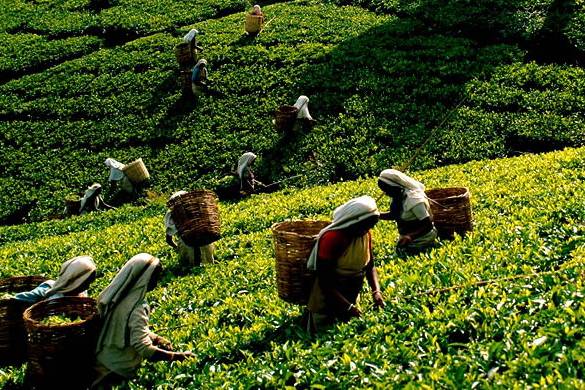1H exports up 10% volume wise and value basis 14%
Key markets contribute to Sri Lanka’s high FOB value; value addition a key aspect, says Asia Siyaka Commodities
Sri Lanka’s Free On Board (FOB) prices for black tea are the highest in the world, Asia Siyaka Commodities PLC revealed yesterday.
It said by June 2021 Sri Lanka had exported 137 million kilograms of tea compared with 124 million kilograms in 1H 2020. The country has earned $ 651 million from these shipments compared with $ 571 million a year ago.
“If weather conditions hold true and agricultural inputs are available as and when needed, the country could easily more than double 1H earnings and move towards the national target of $ 1.5 billion for the year,” Asia Siyaka said. In 2020 the country exported a low quantity of 266 million kilograms, earning $ 1.24 billion.
This sharp drop in export quantity resulted from a drought in the first quarter and reduced application of fertiliser in Q4 2019 and throughout 2020.
Asia Siyaka said earnings recorded in 2020 were made possible by the high prices paid for Ceylon Tea at the Colombo Tea Auctions, as well as the nation’s strong marketing sector adding value to exports under very difficult conditions in the midst of a local and global lockdown.
“FOB value per kilogram for all tea shipped in 2020 was $ 4.67 compared with $ 4.61 in 2019. By June 2021 the average FOB value of tea per kilogram had risen to $ 4.75.”
The FOB value of Indian tea exports in 2020 was $ 3.21. This was considered an attractive figure and resulted from a spike in tea prices at the Indian auctions as a result of a sharp loss in production, mostly from North India. In 2019, India’s FOB figure was $ 3.11, while in the three previous years it ranged from 2.91 to 2.96. Kenya FOB value per kilogram of tea exported in 2020 was $ 2.17 compared with 2.33 the year before. Kenya produced a record quantity of 569 million kilograms in 2020 and flooded the Mombasa auction with below average product that caused the market to collapse, and this trend could continue in 2021.
Customs data analysed by Siyaka Research confirms that Turkey was the prime destination for Ceylon tea exports in 2020. The country absorbed 38.8 million kilograms with an average FOB per kg of $ 4.29. Actual exports to Turkey do realise a much higher FOB value, but the country is a major transit point for shipments to other destinations.
Iraq, which is the number two quantity in terms of destination, has an extremely low FOB value of $ 3.10. Russia follows with 29.6 million kilograms and $ 4.45, with Iran 15.1 million kilograms and $ 4.93, and China 14.1 million kilograms and $ 4.07. They make up the top five destinations; it must be noted however, that China is the fasted growing market, but most exports are in bulk, hence the relatively low FOB.
Asia Siyaka said some important countries that had exceeded the national average FOB per kilogram of $ 4.67 were Azerbaijan (10.3 million kilograms, $ 4.90), Syria (9.5 million kilograms, $ 4.74), Saudi Arabia (which is listed as 11th in quantity at 6.8 million kilograms, and has a very high FOB value of $ 6.89 – this converts to an absolute dollar value of 46.8 million, well above countries that have taken up higher quantity), Germany (6.4 million kilograms, $ 5), USA (5.7 million kilograms, $ 5.62), Japan (5.6 million kilograms, $ 5.42), Jordan (4.6 million kilograms, $ 5.41), and Ukraine (4.5 million kilograms, $ 5.25), all of whom have realised figures above the national average.
It also said there were some key markets that had achieved an FOB in excess of $ 6 per kilogram. Poland (with a quantity of 2.9 million kilograms and an FOB of $ 6.79), Netherlands (2.8 million kilograms, $ 7.43), Ireland (2.2 million kilograms, $ 8.32), Kuwait ($ 6.23), Australia ($ 8.72), New Zealand ($ 8.42), and UK ($ 8.38) are the markets that had imported more than a million kilograms of Ceylon tea in 2020.
Asia Siyaka also said value addition was considered as tea exported in packets, tea bags, instant tea and green tea. Specialty blends shipped in bulk form were not considered value added for this purpose.
Comparison of value-added exports by major Black Tea exporting countries of the world has Sri Lanka in the number one slot, with a massive 55% of all exports in value-added form. India follows at a very distant second, with exports of value-added tea totalling around 10% of all shipments. India has remained in this range of value addition over the past five years with 2016 an exception of 11%. The International Tea Committee statistics do not disclose Kenya’s comparative numbers, but other studies suggest that their value addition figures are well behind India.
“Sri Lanka has fought hard to build these markets over time, and it is critical that the country meets this well-earned demand by supplying the quantities required with the taste expected and trusted over time,” Asia Siyaka said.
“The world pays a premium for Ceylon Tea because of its unique mix of tastes and orthodox style and other attributes. It is critical therefore that we do not tinker with this winning formula. In fact, much effort is needed to protect what we have achieved, by replanting, protecting our micro-climate which brings out our unique taste from the agro ecological regions, and through further strengthening value addition and branding.”
(FT)

